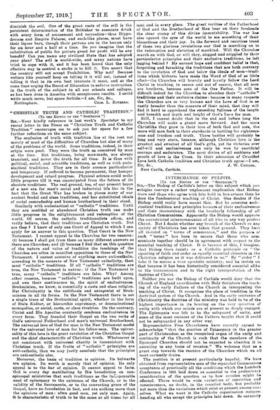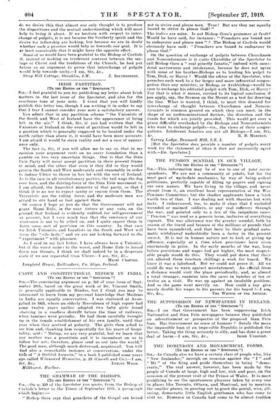INTERCHANGE OF PULPITS. (To THE EDITOR or THE " SPECTATOR:1
SIR,—The Bishop of Carlisle's letter on this subject which you eulogize conveys a rather unpleasant implication that Bishop Gore and those who agree with him hold in less esteem than he does the fundamental teaching of Christ. One doubts if the Bishop could really have meant this. But he censures eccle- siastical tradition and principles because of their exclusiveness and their inconsistency with the brotherly fellowship of all Christian Communions. Apparently the Bishop would approve the unrestricted intercomnsunion of all who iu any way profess Christ. But I doubt whether any branch of the Church or any society of Christians has ever taken that ground. They have all insisted on " terms of communion," and the purpose of such " terms " has been to secure that those who com- municate together should be in agreement with respect to the essential teaching of Christ. It is because of this, I imagine, that Bishop Gore insists as a Catholic principle on " the equating of faith and order as equally essential elements in the Christian religion as it was delivered to us." By " order " I take it he means a true apostolic ministry, and he insists on that because it has been historically considered essential alike to the transmission and to the right interpretation of the doctrine of Christ.
Neither you nor the Bishop of Carlisle would deny that the Church of England co-ordinates with Holy Scripture the teach- ing of the early Fathers of the Church in interpreting the teaching of Christ. It recognizes the place of tradition in the doctrinal system of the Church. And in the early centuries of Christianity the doctrine of the ministry was held to be of the highest importance in its bearing on the very question of unity with which our minds are at present so deeply engaged. The Episoopate was felt to be the safeguard of unity, and some of the most eminent of the Fathers taught that it could not be safeguarded in any other way.
Representative Free Churchmen have recently agreed to
acknowledge " that the position of Episcopacy in the greater part of Christendom as the recognized organ of the unity and continuity of the Church is such that the members of the Episcopal Churches should not be expected to abandon it in assenting to any basis of reunion." We welcome that as a great step towards the reunion of the Churches which we all most earnestly desire.
The position is at present particularly hopeful. We have obtained from representative men of the separated Communions acceptance of practically all the conditions which the Lambeth Conference in 1888 laid down as essential to the preliminary consideration of the question as to how reunion might be effected. There would be wide variations of conviction and consciousness, no doubt, in the reunited body, but probably not more than the variations which exist at present among our- selves. What we want is the Catholic organization compre- hending all who accept the principles laid down. So earnestly
do we desire this that almost our only thought is to produce the dispositions and the mutual understanding which will most help to bring it about. If we hesitate with respect to inter- change of pulpits, it is not because the brotherly spirit and the desire for fellowship are lacking, but because we are in doubt whether such a practice would help us towards our goal. It is at least conceivable that it might have the opposite effect.
Some of us would have been grateful to the Bishop of Carlisle if, instead of making an irrelevant contrast between the say- ings of Christ and the traditions of the Church, he had put before us an argument to prove that interchange of pulpits would help towards unity.—I am, Sir, &c.,
Steep Hill Cottage, Shanklin, I.W. J. SOUTHAMPTON.



































 Previous page
Previous page